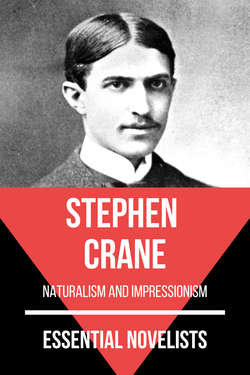Читать книгу Essential Novelists - Stephen Crane - Stephen Crane, August Nemo, John Dos Passos - Страница 12
На сайте Литреса книга снята с продажи.
Chapter 7
Оглавление––––––––
THE YOUTH CRINGED AS if discovered in a crime. By heavens, they had won after all! The imbecile line had remained and become victors. He could hear cheering.
He lifted himself upon his toes and looked in the direction of the fight. A yellow fog lay wallowing on the treetops. From beneath it came the clatter of musketry. Hoarse cries told of an advance.
He turned away amazed and angry. He felt that he had been wronged.
He had fled, he told himself, because annihilation approached. He had done a good part in saving himself, who was a little piece of the army. He had considered the time, he said, to be one in which it was the duty of every little piece to rescue itself if possible. Later the officers could fit the little pieces together again, and make a battle front. If none of the little pieces were wise enough to save themselves from the flurry of death at such a time, why, then, where would be the army? It was all plain that he had proceeded according to very correct and commendable rules. His actions had been sagacious things. They had been full of strategy. They were the work of a master's legs.
Thoughts of his comrades came to him. The brittle blue line had withstood the blows and won. He grew bitter over it. It seemed that the blind ignorance and stupidity of those little pieces had betrayed him. He had been overturned and crushed by their lack of sense in holding the position, when intelligent deliberation would have convinced them that it was impossible. He, the enlightened man who looks afar in the dark, had fled because of his superior perceptions and knowledge. He felt a great anger against his comrades. He knew it could be proved that they had been fools.
He wondered what they would remark when later he appeared in camp. His mind heard howls of derision. Their density would not enable them to understand his sharper point of view.
He began to pity himself acutely. He was ill used. He was trodden beneath the feet of an iron injustice. He had proceeded with wisdom and from the most righteous motives under heaven's blue only to be frustrated by hateful circumstances.
A dull, animal-like rebellion against his fellows, war in the abstract, and fate grew within him. He shambled along with bowed head, his brain in a tumult of agony and despair. When he looked loweringly up, quivering at each sound, his eyes had the expression of those of a criminal who thinks his guilt little and his punishment great, and knows that he can find no words.
He went from the fields into a thick woods, as if resolved to bury himself. He wished to get out of hearing of the crackling shots which were to him like voices.
The ground was cluttered with vines and bushes, and the trees grew close and spread out like bouquets. He was obliged to force his way with much noise. The creepers, catching against his legs, cried out harshly as their sprays were torn from the barks of trees. The swishing saplings tried to make known his presence to the world. He could not conciliate the forest. As he made his way, it was always calling out protestations. When he separated embraces of trees and vines the disturbed foliages waved their arms and turned their face leaves toward him. He dreaded lest these noisy motions and cries should bring men to look at him. So he went far, seeking dark and intricate places.
After a time the sound of musketry grew faint and the cannon boomed in the distance. The sun, suddenly apparent, blazed among the trees. The insects were making rhythmical noises. They seemed to be grinding their teeth in unison. A woodpecker stuck his impudent head around the side of a tree. A bird flew on lighthearted wing.
